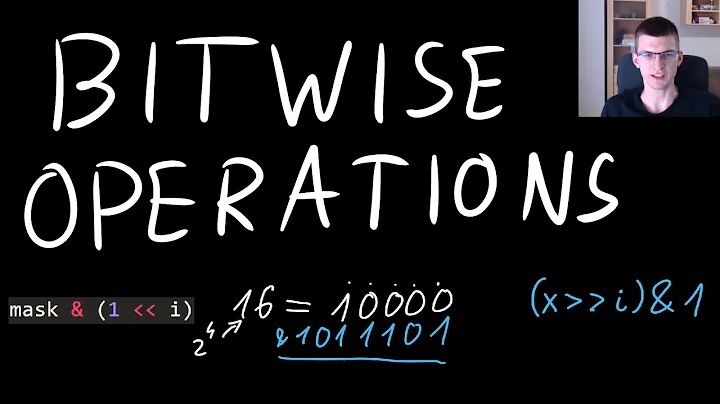Bit operations (C++)
Solution 1
I would imagine they mean comparing bit operations to arithmetic equivalents.
For example, "is a = (a>>1) faster than a = (a / 2)?"
In many cases, simple operations like this will (for various reasons including software and hardware optimisations, pipelining, caching, etc) effectively take 1 CPU cycle, so on modern processors you are unlikely to see a difference - but if they run many instructions in parallel through multiple ALUs then you may still benefit from better utilisation of the CPU's parallel pathways if you mix arithmetic and bitwise operations. If you write in a higher level language then the compiler is very likely to optimise your code to use whatever is the better form, so you'll see the same performance regardless of which way you write your code!
However, there are cases where bitwise operations can be significantly faster than simple arithmetic/logic - for example, you can apply some operations to all the bytes in a 32-bit or 64-bit value with a few bitwise operations (that effectively process all the bytes simultaneously), which would otherwise take a lot of looping and comparing logic to do incrementally. See here for some great examples of what can be achieved. In these cases there is often a significant performance benefit to be gained. (although the exact gain can depend a lot on the CPU you're targeting)
(Alternatively, they may have just meant "is a shift operation faster than an XOR", in which case with modern processors in most cases the answer is probably "no" - most bitwise operations are quick. But that would be a pretty pointless question to ask...)
Solution 2
This is a very strange question to be asked. First of all because the language should be irrelevant - as long as you're writing in a compiled language, any bitwise operation should be compiled down to a single assembly instruction even in the most simplistic assembly languages.
Secondly, once that single assembly instruction hits the processor, it should be evaluated in a single cycle - bitwise stuff is just that simple. It's possible that a space-starved processor would implement the shift operation in a couple cycles (they require a lot more circuitry than the others to do quickly), but that seems pretty unlikely on any modern machine, so even shifts should be single-cycle instructions.
Here's what Wikipedia has to say on the matter:
A bitwise operation operates on one or more bit patterns or binary numerals at the level of their individual bits. On most older microprocessors, bitwise operations are slightly faster than addition and subtraction operations and usually significantly faster than multiplication and division operations. On modern architectures, this is not the case bitwise operations are generally the same speed as addition (though still faster than multiplication).
Hope this helps!
Related videos on Youtube
Yippie-Ki-Yay
Updated on May 22, 2022Comments
-
Yippie-Ki-Yay about 2 years
Recently I had a question on the interview - I was asked to compare bitwise operations in performance terms.
Like, give a brief description of the performance of different bit operations.
I guess this question could is pretty general and pretty machine-specific, but I also think there should be some general rules about this, which you have to mention (and I didn't :).
So - what would you answer?
I probably should also say, that it may be a good idea to compare their performance in C (or C++, whatever), because I assume that these languages give more space for the compiler to perform bit-related optimizations.
Thank you.
Okay, the full problem context.
The interview had several sections and some of them were really a piece of cake, some were a nightmare. Bit-related section was kind of tough and including the questions like:
Floating point number specifications,
float,doubleFast
float->intconversions (and even faster one if you know the range)
Those weren't very tough, but as the last question in this bit-related section I was asked to enumerate bit operations I know and compare their performance.
I answered something not really descriptive like "it's architecture, compiler, ... specific, it won't actually matter, bitwise is already pretty low-level", but I guess this answer sucks.
-
Yippie-Ki-Yay over 13 years@JohnFx See the edit. I understand that the question is kind of broad - I just want to know, like in brief, about the bitwise operations performance.
-
user3001801 over 13 yearsThey are generally very fast because they translate directly to hardware level instructions. How's that?
-
Matt Davis over 13 yearsWhat kind of interview was this? It's hard for me to imagine a job in today's world where the performance of bitwise operations matters.
-
user3001801 over 13 yearsI didn't say anything about every assembly instruction. I said bitwise operations are very fast. Not because they are low level, but because at a hardware level it is optimized for bitwise operations. Other operations have to be ultimately converted into them. I have a feeling you aren't giving us the full context of the question.
-
Niki Yoshiuchi over 13 yearsIf I'm not mistaken, some older architectures didn't support shifting a word by more than one bit. In other words, bit shifts would compile down to N instructions for
i >> N;Probably not the case any more. -
Jason Williams over 13 years@Niki: Yes, prior to the 1980s many CPUs had a "shift one position left/right" instructions that took one cycle to shift everything a single bit-position, so i>>20 would take 20 cycles. Through the 1990s it became increasingly common for CPUs to have barrel shifters that could do any number of shifts in a single cycle.
-
 Domi almost 10 yearsYour first sentence "In many cases, simple operations like this will take 1 CPU cycle" seems rather false. 1. Many high-performance CPUs (read Intel, AMD but also others) have very deep pipelines. They do not have single cycle operations anymore. However, you are right that often the performance of these instructions might be about the same, simply because the pipeline is so deep. 2. In terms of CPU instructions, integer division is by no means a "simple operation". 3. The speed will often be exactly the same because compilers tend to convert
Domi almost 10 yearsYour first sentence "In many cases, simple operations like this will take 1 CPU cycle" seems rather false. 1. Many high-performance CPUs (read Intel, AMD but also others) have very deep pipelines. They do not have single cycle operations anymore. However, you are right that often the performance of these instructions might be about the same, simply because the pipeline is so deep. 2. In terms of CPU instructions, integer division is by no means a "simple operation". 3. The speed will often be exactly the same because compilers tend to converta/2intoa>>1, not because of the CPU.
![#37 [C++]. Toán Tử Bit Trong C++ | Bitwise Operators](https://i.ytimg.com/vi/sfa7X7TnBzk/hq720.jpg?sqp=-oaymwEcCNAFEJQDSFXyq4qpAw4IARUAAIhCGAFwAcABBg==&rs=AOn4CLDlCBxhDGmuUYVrO-QERCFWAenlnA)







